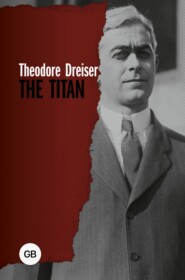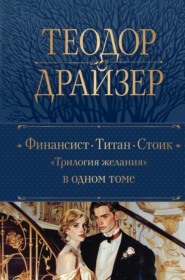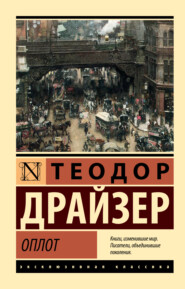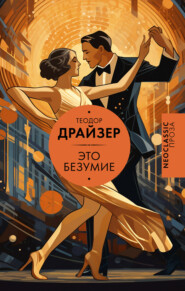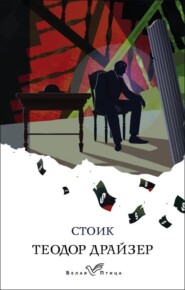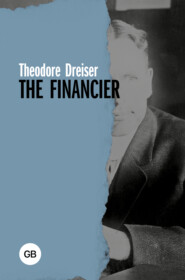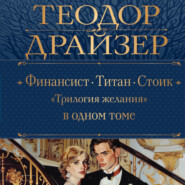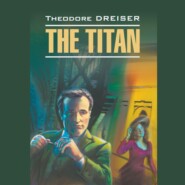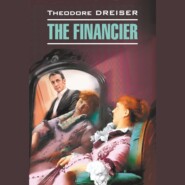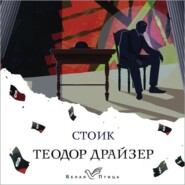По всем вопросам обращайтесь на: info@litportal.ru
(©) 2003-2025.
✖
The "Genius"
Настройки чтения
Размер шрифта
Высота строк
Поля
His interest in Norma Whitmore had increased greatly as the winter passed. In this woman he had found an intellect as broadening and refining as any he had encountered. Her taste for the exceptional in literature and art was as great as that of anyone he had ever known and it was just as individual. She ran to impressive realistic fiction in literature and to the kind of fresh-from-the-soil art which Eugene represented. Her sense of just how big and fresh was the thing he was trying to do was very encouraging, and she was carrying the word about town to all her friends that he was doing it. She had even gone so far as to speak to two different art dealers asking them why they had not looked into what seemed to her his perfectly wonderful drawings.
"Why, they're astonishing in their newness," she told Eberhard Zang, one of the important picture dealers on Fifth Avenue. She knew him from having gone there to borrow pictures for reproduction.
"Witla! Witla!" he commented in his conservative German way, rubbing his chin, "I doand remember seeing anything by him."
"Of course you don't," replied Norma persistently. "He's new, I tell you. He hasn't been here so very long. You get Truth for some week in last month – I forget which one – and see that picture of Greeley Square. It will show you what I mean."
"Witla! Witla!" repeated Zang, much as a parrot might fix a sound in its memory. "Tell him to come in here and see me some day. I should like to see some of his things."
"I will," said Norma, genially. She was anxious to have Eugene go, but he was more anxious to get a lot of things done before he had an exhibition. He did not want to risk an impression with anything short of a rather extensive series. And his collection of views was not complete at that time. Besides he had a much more significant art dealer in mind.
He and Norma had reached the point by this time where they were like brother and sister, or better yet, two good men friends. He would slip his arm about her waist when entering her rooms and was free to hold her hands or pat her on the arm or shoulder. There was nothing more than strong good feeling on his part, while on hers a burning affection might have been inspired, but his genial, brotherly attitude convinced her that it was useless. He had never told her of any of his other women friends and he was wondering as he rode west how she and Miriam Finch would take his marriage with Angela, supposing that he ever did marry her. As for Christina Channing, he did not want to think – really did not dare to think of her very much. Some sense of lost beauty came to him out of that experience – a touch of memory that had a pang in it.
Chicago in June was just a little dreary to him with its hurry of life, its breath of past experience, the Art Institute, the Daily Globe building, the street and house in which Ruby had lived. He wondered about her (as he had before) the moment he neared the city, and had a strong desire to go and look her up. Then he visited the Globe offices, but Mathews had gone. Genial, cheerful Jerry had moved to Philadelphia recently, taking a position on the Philadelphia North American, leaving Howe alone, more finicky and picayune than ever. Goldfarb, of course, was gone and Eugene felt out of it. He was glad to take the train for Blackwood, for he felt lonesome. He left the city with quite an ache for old times in his heart and the feeling that life was a jumble of meaningless, strange and pathetic things.
"To think that we should grow old," he pondered, "that things that were as real as these things were to me, should become mere memories."
The time just before he reached Blackwood was one of great emotional stress for Angela. Now she was to learn whether he really loved her as much as he had. She was to feel the joy of his presence, the subtle influence of his attitude. She was to find whether she could hold him or not. Marietta, who on hearing that he was coming, had rather plumed herself that her letter had had something to do with it, was afraid that her sister would not make good use of this opportune occasion. She was anxious that Angela should look her best, and made suggestions as to things she might wear, games she might play (they had installed tennis and croquet as part of the home pleasures since he had been there last) and places they might go to. Marietta was convinced that Angela was not artful enough – not sufficiently subtle in her presentation of her charms. He could be made to feel very keen about her if she dressed right and showed herself to the best advantage. Marietta herself intended to keep out of the way as much as possible when Eugene arrived, and to appear at great disadvantage in the matter of dress and appearance when seen; for she had become a perfect beauty and was a breaker of hearts without conscious effort.
"You know that string of coral beads I have, Angel Face," she asked Angela one morning some ten days before Eugene arrived. "Wear them with that tan linen dress of mine and your tan shoes some day for Eugene. You'll look stunning in those things and he'll like you. Why don't you take the new buggy and drive over to Blackwood to meet him? That's it. You must meet him."
"Oh, I don't think I want to, Babyette," she replied. She was afraid of this first impression. She did not want to appear to run after him. Babyette was a nickname which had been applied to Marietta in childhood and had never been dropped.
"Oh, pshaw, Angel Face, don't be so backward! You're the shyest thing I know. Why that's nothing. He'll like you all the better for treating him just a little smartly. You do that now, will you?"
"I can't," replied Angela. "I can't do it that way. Let him come over here first; then I'll drive him over some afternoon."
"Oh, Angel Face! Well, anyhow, when he comes you must wear that little rose flowered house dress and put a wreath of green leaves in your hair."
"Oh, I won't do anything of the sort, Babyette," exclaimed Angela.
"Yes, you will," replied her sister. "Now you just have to do what I tell you for once. That dress looks beautiful on you and the wreath will make it perfect."
"It isn't the dress. I know that's nice. It's the wreath."
Marietta was incensed by this bit of pointless reserve.
"Oh, Angela," she exclaimed, "don't be so silly. You're older than I am, but I know more about men in a minute than you'll ever know. Don't you want him to like you? You'll have to be more daring – goodness! Lots of girls would go a lot farther than that."
She caught her sister about the waist and looked into her eyes. "Now you've got to wear it," she added finally, and Angela understood that Marietta wanted her to entice Eugene by any means in her power to make him declare himself finally and set a definite date or take her back to New York with him.
There were other conversations in which a trip to the lake was suggested, games of tennis, with Angela wearing her white tennis suit and shoes, a country dance which might be got up – there were rumors of one to be given in the new barn of a farmer some seven miles away. Marietta was determined that Angela should appear youthful, gay, active, just the things which she knew instinctively would fascinate Eugene.
Finally Eugene came. He arrived at Blackwood at noon. Despite her objections Angela met him, dressed smartly and, as urged by Marietta, carrying herself with an air. She hoped to impress Eugene with a sense of independence, but when she saw him stepping down from the train in belted corduroy travelling suit with a grey English travelling cap, carrying a green leather bag of the latest design, her heart misgave her. He was so worldly now, so experienced. You could see by his manner that this country place meant little or nothing to him. He had tasted of the world at large.
Angela had stayed in her buggy at the end of the depot platform and she soon caught Eugene's eye and waved to him. He came briskly forward.
"Why, sweet," he exclaimed, "here you are. How nice you look!" He jumped up beside her, surveying her critically and she could feel his examining glance. After the first pleasant impression he sensed the difference between his new world and hers and was a little depressed by it. She was a little older, no doubt of that. You cannot hope and yearn and worry for three years and not show it. And yet she was fine and tender and sympathetic and emotional. He felt all this. It hurt him a little for her sake and his too.
"Well, how have you been?" he asked. They were in the confines of the village and no demonstration could be made. Until the quiet of a country road could be reached all had to be formal.
"Oh, just the same, Eugene, longing to see you."
She looked into his eyes and he felt the impact of that emotional force which governed her when she was near him. There was something in the chemistry of her being which roused to blazing the ordinarily dormant forces of his sympathies. She tried to conceal her real feeling – to pretend gaiety and enthusiasm, but her eyes betrayed her. Something roused in him now at her look – a combined sense of emotion and desire.
"It's so fine to be out in the country again," he said, pressing her hand, for he was letting her drive. "After the city, to see you and the green fields!" He looked about at the little one-storey cottages, each with a small plot of grass, a few trees, a neat confining fence. After New York and Chicago, a village like this was quaint.
"Do you love me just as much as ever?"
She nodded her head. They reached a strip of yellow road, he asking after her father, her mother, her brothers and sisters, and when he saw that they were unobserved he slipped his arm about her and drew her head to him.
"Now we can," he said.
She felt the force of his desire but she missed that note of adoration which had seemed to characterize his first lovemaking. How true it was he had changed! He must have. The city had made her seem less significant. It hurt her to think that life should treat her so. But perhaps she could win him back – could hold him anyhow.
They drove over toward Okoonee, a little crossroads settlement, near a small lake of the same name, a place which was close to the Blue house, and which the Blue's were wont to speak of as "home." On the way Eugene learned that her youngest brother David was a cadet at West Point now and doing splendidly. Samuel had become western freight agent of the Great Northern and was on the way to desirable promotion. Benjamin had completed his law studies and was practising in Racine. He was interested in politics and was going to run for the state legislature. Marietta was still the gay carefree girl she had always been, not at all inclined to choose yet among her many anxious suitors. Eugene thought of her letter to him – wondered if she would look her thoughts into his eyes when he saw her.
"Oh, Marietta," Angela replied when Eugene asked after her, "she's just as dangerous as ever. She makes all the men make love to her."
Eugene smiled. Marietta was always a pleasing thought to him. He wished for the moment that it was Marietta instead of Angela that he was coming to see.
She was as shrewd as she was kind in this instance. Her appearance on meeting Eugene was purposely indifferent and her attitude anything but coaxing and gay. At the same time she suffered a genuine pang of feeling, for Eugene appealed to her. If it were anybody but Angela, she thought, how she would dress and how quickly she would be coquetting with him. Then his love would be won by her and she felt that she could hold it. She had great confidence in her ability to keep any man, and Eugene was a man she would have delighted to hold. As it was she kept out of his way, took sly glances at him here and there, wondered if Angela would truly win him. She was so anxious for Angela's sake. Never, never, she told herself, would she cross her sister's path.
At the Blue homestead he was received as cordially as before. After an hour it quite brought back the feeling of three years before. These open fields, this old house and its lovely lawn, all served to awaken the most poignant sensations. One of Marietta's beaux, over from Waukesha, appeared after Eugene had greeted Mrs. Blue and Marietta, and the latter persuaded him to play a game of tennis with Angela. She invited Eugene to make it a four with her, but not knowing how he refused.
Angela changed to her tennis suit and Eugene opened his eyes to her charms. She was very attractive on the court, quick, flushed, laughing. And when she laughed she had a charming way of showing her even, small, white teeth. She quite awakened a feeling of interest – she looked so dainty and frail. When he saw her afterward in the dark, quiet parlor, he gathered her to his heart with much of the old ardour. She felt the quick change of feeling. Marietta was right. Eugene loved gaiety and color. Although on the way home she had despaired this was much more promising.
Eugene rarely entered on anything half heartedly. If interested at all he was greatly interested. He could so yield himself to the glamour of a situation as to come finally to believe that he was something which he was not. Thus, now he was beginning to accept this situation as Angela and Marietta wished he should, and to see her in somewhat the old light. He overlooked things which in his New York studio, surrounded by the influences which there modified his judgment, he would have seen. Angela was not young enough for him. She was not liberal in her views. She was charming, no doubt of that, but he could not bring her to an understanding of his casual acceptance of life. She knew nothing of his real disposition and he did not tell her. He played the part of a seemingly single-minded Romeo, and as such he was from a woman's point of view beautiful to contemplate. In his own mind he was coming to see that he was fickle but he still did not want to admit it to himself.
There was a night of stars after an evening of June perfection. At five old Jotham came in from the fields, as dignified and patriarchal as ever. He greeted Eugene with a hearty handshake, for he admired him. "I see some of your work now and then," he said, "in these monthly magazines. It's fine. There's a young minister down here near the lake that's very anxious to meet you. He likes to get hold of anything you do, and I always send the books down as soon as Angela gets through with them."
He used the words books and magazines interchangeably, and spoke as though they were not much more important to him than the leaves of the trees, as indeed, they were not. To a mind used to contemplating the succession of crops and seasons, all life with its multitudinous interplay of shapes and forms seemed passing shadows. Even men were like leaves that fall.
Eugene was drawn to old Jotham as a filing to a magnet. His was just the type of mind that appealed to him, and Angela gained by the radiated glory of her father. If he was so wonderful she must be something above the average of womanhood. Such a man could not help but produce exceptional children.
Left alone together it was hardly possible for Angela and Eugene not to renew the old relationship on the old basis. Having gone as far as he had the first time it was natural that he should wish to go as far again and further. After dinner, when she turned to him from her room, arrayed in a soft evening dress of clinging texture – somewhat low in the neck by request of Marietta, who had helped her to dress – Eugene was conscious of her emotional perturbation. He himself was distraught, for he did not know what he would do – how far he would dare to trust himself. He was always troubled when dealing with his physical passion, for it was a raging lion at times. It seemed to overcome him quite as a drug might or a soporific fume. He would mentally resolve to control himself, but unless he instantly fled there was no hope, and he did not seem able to run away. He would linger and parley, and in a few moments it was master and he was following its behest blindly, desperately, to the point almost of exposure and destruction.
Tonight when Angela came back he was cogitating, wondering what it might mean. Should he? Would he marry her? Could he escape? They sat down to talk, but presently he drew her to him. It was the old story – moment after moment of increasing feeling. Presently she, from the excess of longing and waiting was lost to all sense of consideration. And he —
"I shall have to go away, Eugene," she pleaded, when he carried her recklessly into his room, "if anything happens. I cannot stay here."
"Don't talk," he said. "You can come to me."
"You mean it, Eugene, surely?" she begged.
"As sure as I'm holding you here," he replied.
At midnight Angela lifted frightened, wondering, doubting eyes, feeling herself the most depraved creature. Two pictures were in her mind alternately and with pendulum-like reiteration. One was a composite of a marriage altar and a charming New York studio with friends coming in to see them much as he had often described to her. The other was of the still blue waters of Okoonee with herself lying there pale and still. Yes, she would die if he did not marry her now. Life would not be worth while. She would not force him. She would slip out some night when it was too late and all hope had been abandoned – when exposure was near – and the next day they would find her.






